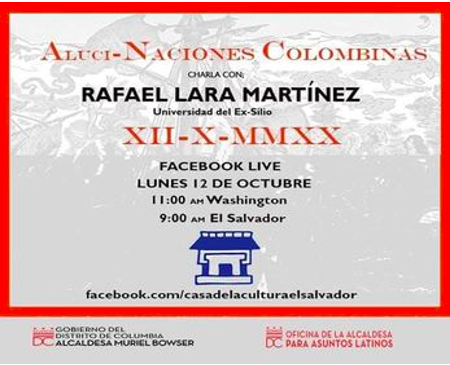“Aluci-Naciones Colombinas” rastrea los eventos históricos (1492) y científicos (geografía, astronomía) que permiten los viajes de Cristóbal Colón a las Indias (1). Luego de este enfoque objetivo a lo colonial, la charla lee su “Diario”, según “relación compendiada por Fray Bartolomé de Las Casas”. Desde una perspectiva testimonial implica la distancia testimoniante-transcriptor, imagen-palabra en la percepción, al igual que mentiras y desconfianza hablante-oyente, como rasgos esenciales del reporte (2). En fin, en vez de asumir responsabilidades, las Naciones independientes alucinan que todos los crímenes son su falta, al redimir a sus próceres y letrados del error (3). Obviamente, esta charla seria no excluye la obertura humorística de su título (0).
= Preludio (0) – Objetividad (1) – Subjetividad (2) – Aluci-Nación (3).
//
“Columbian Halluci-Nations” traces the historical (1492) & scientific (geography, astronomy) events that direct Christopher Columbus’ trips to the Indies (1). Following this objective approach to colonialism, the talk reads his “Journal”, according to the “abridged relation by Fray Bartolomé de Las Casas”. From a testimonial perspective, it implies distance witness-transcriber, image-words in perception, along with lies, and mistrust speaker-listener, as essential traits to the account (2). Finally, instead of assuming responsibility, independent Nations hallucinate that all crimes are his fault to redeem their founding fathers and clerks of any error (3). Obviously, this serious talk cannot exclude the humorous overture of its title (0).
= Prelude (0) – Objectivity (1) – Subjectivity (2) – Halluci-Nation (3).
…A la descolinización / …to Descolonization Filosofía náhuat
Expresiones culturales originariuas, ITCA, clase de María Elena Guardado
Martes 13 de octubre de 2020 @ 10am (SV) – 6pm (FR)
«Filosofía náhuat» ofrece una introducción a la lengua como conocimiento, sin exigir «el monolingüismo del Otro». Filosofía significa la sabiduría (sophos) del amigo (philos), en su enfoque particular de conceptos universales. Pertenecientes a la familia yuto-nahua/nicarao, los nahuas emigran a Centro América conservando lazos culturales permanentes con el suroeste de EEUU y México. Se comenta su filiación gramatical —lengua omni-predicativa, reiterativa, marca rectora, paratáctica y poética serial— además de ejemplificar la formación de conceptos epistémicos y el uso de las partes del cuerpo en un sentido abstracto. Luego de referir cómo la aritmética se asienta en la mano, se presenta el concepto de persona, cuya energía anímica se disgrega a lo largo del cuerpo de un sujeto fractal. Este cuerpo humano vive en un cosmos en constante yahualidad o rotación. Su dualidad —invierno-xupan y verano-tunalku— genera un intercambio entre los opuestos complementarios. Ese compromiso natural nutre lo humano, gracias a un ciclo biológico depredador en un «sacrum-facere» permanente. La reproducción sexual calca la natural que —en su zenit y nadir— alterna la identidad de género según el ascenso y descenso astral y social. Enterrada en el recuerdo, la historia la rescata un viaje al inframundo que efectúa un Dante indígena en busca de huellas. Por último, la charla insinúa temáticas a desarrollar para incitar a la audiencia a continuar la investigación.
«Nahuat Philosophy» offers an introduction to language as knowledge, without requiring «monolingualism of the Other». Philosophy means the wisdom (sophos) of friendship (philos), in its particular approach to universal concepts. Belonging to the Yuto-Nahua/Nicarao family, the Nahuas migrate to Central America preserving permanent cultural ties with the southwestern United States and Mexico. Its grammatical affiliation is discussed —an omni-predicative, head-marking, reiterative, paratactic and serial-poetic language— as well as the formation of epistemic concepts, and the use of body parts in an abstract sense. After referring how arithmetic is established in the hand, the talk presents the concept of person, whose soul energy spreads throughout the body of a fractal subject. This human body lives in a cosmos in constant yahuality or rotation. Its duality —winter-xupan and summer-tunalku— generates an exchange between complementary opposites. In this engagement, nature feeds humans thanks to a predatory biological cycle in a permanent «sacrum-facere». Sexual reproduction copies nature that —in its zenith and nadir— alternate gender identity, according to an astral and social rule of upsurge and decline. Buried in remembrance, history is rescued by a voyage to the underworld, made by an indigenous Dante in search of traces. Finally, the talk suggests themes to be developed, in order to encourage the audience to continue the research



